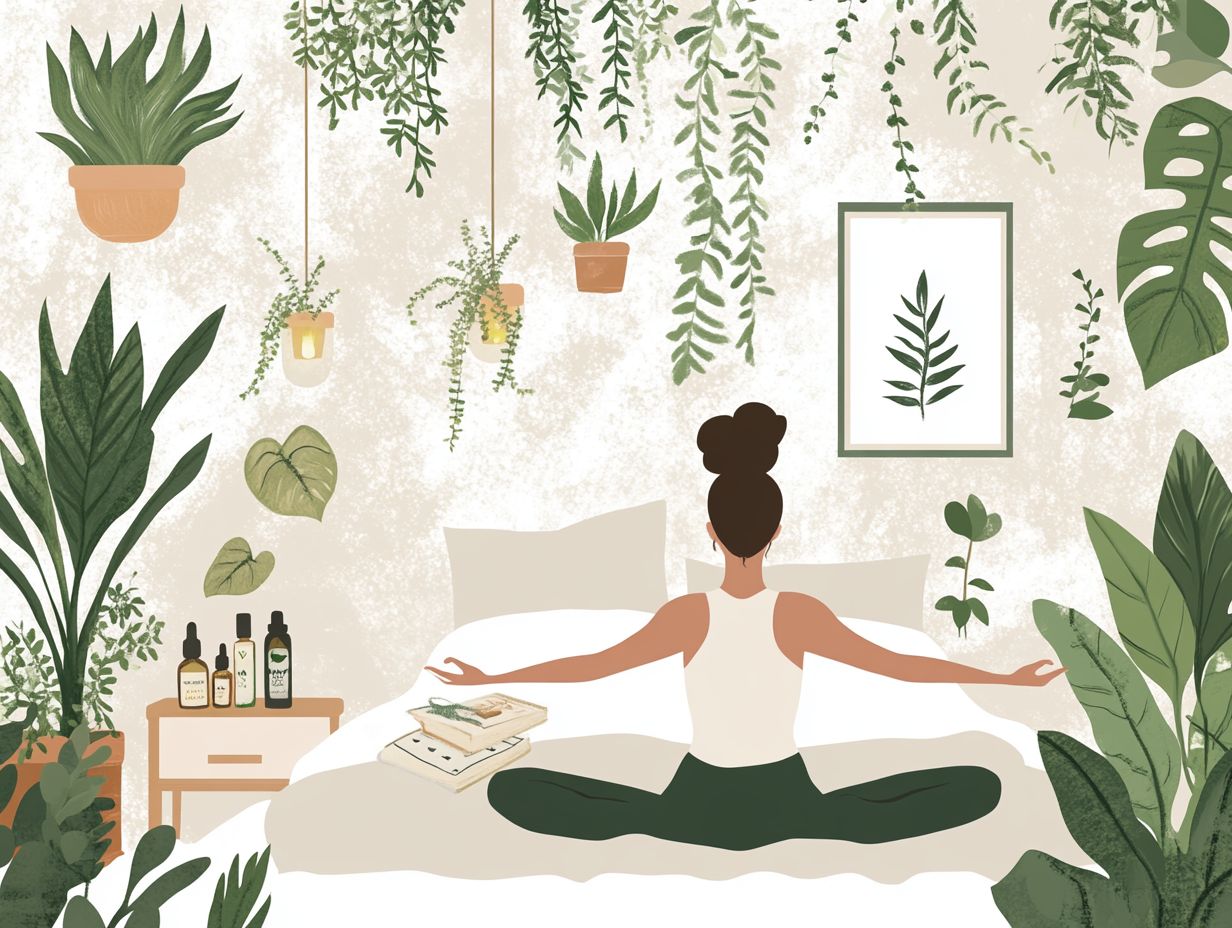16. 5 Integrative Health Practices for Better Sleep
Struggling with sleepless nights? You re not alone in this struggle let s tackle it together! Quality sleep is vital for your overall well-being, yet many encounter obstacles in attaining it.
This article delves into 15 effective strategies tailored for you, such as establishing a consistent sleep schedule, crafting a calming bedtime routine, and incorporating mindfulness techniques.
It explores integrative health practices designed to enhance sleep quality. Discover practical tips and remedies that can help you reclaim those restful nights, allowing you to awaken rejuvenated and ready to embrace the day.
Contents
- Key Takeaways:
- 1. Establish a Consistent Sleep Schedule
- 2. Create a Relaxing Bedtime Routine
- 3. Avoid Stimulating Activities Before Bed
- 4. Limit Caffeine and Alcohol Intake
- 5. Incorporate Mindfulness and Meditation
- 6. Try Natural Supplements or Remedies
- 7. Invest in a Comfortable Mattress and Pillows
- 8. Keep Your Bedroom Cool, Dark, and Quiet
- 9. Exercise Regularly, But Not Too Close to Bedtime
- 10. Avoid Heavy or Spicy Meals Before Bed
- 11. Use Aromatherapy or Essential Oils
- 12. Try Acupuncture or Acupressure
- 13. Keep a Sleep Diary to Track Patterns and Triggers
- 14. Seek Professional Help If Necessary
- 15. Remember That Quality Sleep is Essential for Overall Health
- What Is Integrative Health and How Can It Improve Sleep?
- What Are the Benefits of Using Integrative Health Practices for Sleep?
- How Can One Incorporate Integrative Health Practices into Their Daily Routine?
- What Are the Common Causes of Insomnia and How Can Integrative Health Practices Address Them?
- What Are the Potential Risks or Side Effects of Integrative Health Practices for Sleep?
- Frequently Asked Questions
- What is the importance of sleep for our health?
- How can integrative health practices help improve sleep?
- What are some examples of integrative health practices for better sleep?
- How often should I practice these integrative health techniques for better sleep?
- Can integrative health practices be used alongside traditional medical treatments?
- Are there any risks associated with integrative health practices for better sleep?
Key Takeaways:

Set a regular sleep schedule tonight for better rest! Create a relaxing bedtime routine that includes activities like reading, listening to calming music, or taking a warm bath to promote relaxation and sleep. Incorporate mindfulness and meditation into your daily routine to reduce stress and promote relaxation, leading to better sleep.
1. Establish a Consistent Sleep Schedule
Establishing a consistent sleep schedule is essential for anyone dealing with sleep disorders like insomnia or sleep apnea. It not only helps regulate your sleep patterns but also improves the overall quality of your rest.
By maintaining regular sleep routines, you can significantly reduce insomnia’s severity and improve your psychological and physical health over time.
The importance of setting a fixed bedtime and wake-up time cannot be overstated. This practice promotes better rest and plays a crucial role in long-term health outcomes.
A consistent schedule can positively influence your mood, energy levels, and cognitive performance, transforming daily tasks into much more manageable activities.
Try to limit screen time before bed and dim the lights an hour before sleeping to create a more restful environment.
Prioritizing this routine unlocks the restorative benefits of sleep, leading to better concentration and overall well-being.
2. Create a Relaxing Bedtime Routine
Creating a relaxing bedtime routine works wonders for your healthy sleep habits and is a powerful strategy to combat insomnia and other sleep disturbances.
This leads to not only improved sleep quality but also better emotional responses to daily stressors.
Incorporating specific relaxation techniques can transform your nightly ritual into a true sanctuary of calm. For instance, indulging in a warm bath soothes tense muscles and signals to your body that it s time to unwind.
Mindfulness meditation can help you release racing thoughts, allowing for a peaceful transition into sleep. Engaging in guided meditation deepens your sense of tranquility and helps you cultivate a serene mindset.
By reducing cognitive load before hitting the pillow and creating a calming environment think dim lights, low noise levels, and comfortable bedding you lay the groundwork for restorative rest.
This intentional approach not only makes slumber more attainable but also nurtures your overall well-being.
3. Avoid Stimulating Activities Before Bed
Avoiding stimulating activities before bed is crucial for promoting a more restful night. Engaging in high-stress activities can heighten anxiety and may contribute to chronic insomnia.
This includes excessive screen time, which inundates your brain with blue light, keeping it overly alert, as well as intense exercise that ramps up your heart rate.
Even participating in stressful discussions can unleash a wave of cortisol, making it harder to relax before sleep.
Try to cut back on these activities to cultivate a serene environment that enhances your sleep quality and supports your emotional well-being.
Embracing quieter, calming practices in the evening can transform your nights into restful escapes and your mornings into rejuvenated beginnings.
Start tonight! Try these tips and reclaim your restful nights your body will thank you!
4. Limit Caffeine and Alcohol Intake
Limiting your caffeine and alcohol intake is crucial if you re grappling with sleep disorders like insomnia or sleep apnea. Both substances can have a profound impact on your sleep quality and can even worsen insomnia.
Caffeine is a well-known stimulant that boosts alertness by blocking chemicals in your brain that help you feel tired. This makes it challenging to both fall asleep and stay asleep. Alcohol, on the other hand, might initially seem like a friend, lulling you into drowsiness. However, it ultimately disrupts your sleep cycle, preventing you from reaching that all-important restorative deep sleep.
This can lead to fragmented sleep patterns and more frequent awakenings throughout the night, complicating any existing sleep struggles. Swap your usual drinks now for better sleep tonight! Consider alternatives like herbal teas infused with chamomile or valerian root. These options are renowned for their calming properties and can significantly enhance your sleep hygiene.
5. Incorporate Mindfulness and Meditation
Incorporating mindfulness and meditation techniques into your daily routine can significantly enhance your sleep quality, alleviating stress and improving emotional responses often disrupted by restless nights.
Engage in practices like guided meditation to tap into focused breathing and visualization. This helps quiet your mind and prepares your body for a truly restful slumber.
These techniques promote relaxation and foster a deeper awareness of your thoughts and feelings. As you become more attuned to your mental states, you may notice an improvement in managing anxiety, leading to more restorative sleep and an overall greater sense of well-being. Integrating these methods can elevate your psychological health, creating a harmonious balance between your mind and body.
6. Try Natural Supplements or Remedies
Exploring natural supplements or remedies like melatonin, valerian, and chamomile can be a sophisticated strategy for enhancing your sleep quality, especially if you’re grappling with insomnia or other sleep-related challenges. These options have become increasingly popular for their potential to nurture restful nights and their generally favorable safety profiles compared to traditional pharmaceuticals.
Understand how these supplements work for better sleep. Melatonin, a natural hormone that helps you sleep, plays a crucial role in regulating your sleep-wake cycle. It s typically recommended in doses ranging from 0.5 to 5 mg, taken about 30 to 60 minutes before you hit the pillow.
Valerian root may promote relaxation and reduce the time it takes to fall asleep; some studies suggest a dose of 300-600 mg before bed. Let s not overlook chamomile, often savored as a calming tea, which is renowned for its soothing effects and usually comes with little to no side effects.
However, be mindful of potential interactions with any medications you may be taking. Consulting with your healthcare provider before embarking on a new supplement regimen is essential. Recent sleep research underscores the significance of timing and dosage to maximize the effectiveness of these natural aids.
7. Invest in a Comfortable Mattress and Pillows

Investing in a high-quality mattress and pillows is essential for enhancing your sleep quality and hygiene, significantly reducing sleep disturbances that could lead to chronic insomnia and other physical ailments.
Regarding selecting the ideal sleep surfaces, consider your personal comfort preferences, such as firmness and material. A medium-firm mattress typically helps align your spine, alleviating back pain, while softer options provide a plush embrace for those who enjoy sinking into their bed.
Choosing pillows that cater to your sleeping position whether you re a back, side, or stomach sleeper can further elevate your comfort. Understanding how your sleep surfaces affect your physical health is crucial. The right choices can pave the way for a restorative night’s sleep, significantly contributing to your overall well-being.
Start implementing these tips right away for immediate benefits!
8. Keep Your Bedroom Cool, Dark, and Quiet
Keeping your bedroom cool, dark, and quiet is essential for achieving optimal sleep quality. Environmental factors play a significant role in sleep hygiene and can exacerbate sleep-related issues.
To create the perfect sleeping environment, consider adjusting your thermostat to a cooler temperature. This helps your body naturally lower its core temperature, which is crucial for falling asleep.
Incorporating blackout curtains can effectively block out unwanted light, transforming your space into a serene sanctuary that promotes restful nights.
Making a room quieter is another key element. Adding soft furnishings or using white noise machines can help drown out disruptive noises from outside.
By prioritizing these factors, you can cultivate a peaceful setting that alleviates anxiety and significantly enhances your overall restfulness, paving the way for revitalized mornings.
9. Exercise Regularly, But Not Too Close to Bedtime
Regular exercise is an invaluable ally in enhancing sleep quality and minimizing daytime drowsiness. However, timing your workouts wisely is vital to ensure they don’t interfere with your ability to drift off at night.
Engaging in physical activity can significantly aid relaxation, as it triggers the release of endorphins and helps to alleviate stress. When you commit to regular workouts, your body becomes more physically fatigued, making it easier to transition into sleep.
For optimal results, schedule your workouts in the morning or early afternoon. Exercising too close to bedtime may elevate your energy levels, making it challenging to achieve that restful slumber you desire.
Gentle activities like yoga or stretching in the evening can be an excellent strategy to wind down and prepare your body for a rejuvenating night’s rest.
10. Avoid Heavy or Spicy Meals Before Bed
Avoiding heavy or spicy meals before bed can significantly elevate your sleep quality. Your dietary choices directly impact sleep disturbances, including insomnia and digestive discomfort.
Certain foods, particularly those rich in carbohydrates and lean proteins, can encourage the production of sleep-inducing hormones like serotonin and melatonin. On the other hand, drinks with caffeine and excessive sugar intake, especially in the evening, can lead to restless nights that should be avoided.
By opting for a light dinner two to three hours before bedtime, you allow your body the necessary time to digest, paving the way for a more restful slumber. Consider a light dinner that includes options like grilled chicken and vegetables.
Healthy snacks that won’t disturb your sleep include:
- A small bowl of cherries
- A handful of nuts
- A slice of whole grain toast with a light spread
These options can effectively satisfy late-night cravings without disturbing your sleep patterns.
11. Use Aromatherapy or Essential Oils
Try using aromatherapy or essential oils to boost your sleep quality and promote relaxation. These natural remedies serve as a complementary approach to traditional sleep hygiene practices for anyone grappling with sleep disturbances.
These remedies tap into the soothing power of botanical extracts, with lavender and chamomile being particularly effective options.
Lavender, with its delightful floral scent, is perfect for diffusing in the bedroom, creating a serene atmosphere that invites tranquility. Chamomile can be applied topically in a diluted form or enjoyed as a calming tea to help ease the mind.
Consider adding a few drops of these essential oils to a warm bath. This simple ritual can transform your night into a luxurious escape you won t want to miss!
Ultimately, weaving these practices into your daily routine cultivates an environment that supports restful sleep and enhances emotional well-being.
12. Try Acupuncture or Acupressure
Acupuncture and acupressure may help if you’re struggling with insomnia. These techniques can improve your sleep quality.
Research shows they work by stimulating specific points on your body. This balances energy flow, or Qi, calming your nervous system and promoting relaxation.
Many studies indicate that acupuncture can reduce anxiety and improve sleep patterns.
For instance, a clinical trial found that participants with chronic insomnia experienced better sleep after regular acupuncture sessions.
Acupressure, which involves applying pressure to certain points, also helps reduce stress, leading to more restful nights.
13. Keep a Sleep Diary to Track Patterns and Triggers
A sleep diary is a valuable tool for anyone dealing with sleep disorders. It helps you track your sleep patterns and identify triggers affecting your rest.
Document not just your sleep hours, but also your routines, caffeine intake, and emotions. This holistic view can reveal how late meals or stress impact your sleep quality.
This awareness allows you to make lifestyle changes that improve your sleep hygiene. Sharing insights with your healthcare provider can lead to personalized interventions, enhancing your care.
14. Seek Professional Help If Necessary

If you have severe sleep disorders like insomnia or sleep apnea, seek professional help. This is crucial for your psychological health and addressing any underlying issues.
Recognize when sleep problems affect your daily life. Timely intervention is essential.
Cognitive Behavioral Therapy (CBT) effectively manages sleep disorders. It provides strategies to ease symptoms and tackle the root causes of insomnia.
A tailored treatment plan from a healthcare professional can lead to significant improvements. Addressing related conditions like anxiety can help you achieve better sleep.
15. Remember That Quality Sleep is Essential for Overall Health
Quality sleep is vital for your health. Skimping on sleep can lead to long-term issues like cognitive decline and heart disease.
Research indicates that good sleep enhances mood regulation and stress management, crucial for mental well-being.
One study shows that those who sleep less than seven hours are 3.5 times more likely to feel depressed. Adequate sleep also strengthens your immune system.
Prioritizing restorative sleep can boost your daily functioning and help prevent chronic health issues. Take action now for better sleep!
What Is Integrative Health and How Can It Improve Sleep?
Integrative health presents a whole-person approach to your well-being, employing a variety of modalities like mindfulness meditation to tackle sleep disturbances and enhance your overall sleep quality.
This comprehensive framework seamlessly merges conventional medicine with alternative practices, acknowledging the profound interconnection between your mental, emotional, and physical health.
In this paradigm, mindfulness meditation not only brings about relaxation but also elevates your self-awareness, enabling you to effectively manage stress and anxiety.
Cognitive Behavioral Therapy (CBT), which helps change negative thought patterns, offers a structured method for pinpointing and transforming the issues that disrupt your restful sleep.
Natural remedies, such as herbal teas and essential oils, foster a calming atmosphere that is essential for better sleep.
By integrating these diverse therapies, you can craft a personalized toolkit that works in harmony to support deeper, more restorative slumber.
What Are the Benefits of Using Integrative Health Practices for Sleep?
Using integrative health practices for sleep offers amazing benefits that can transform your sleep! These benefits include enhanced sleep quality, improved psychological health, and a whole-person approach to managing disturbances like insomnia, such as through energy healing techniques for better sleep.
These methods not only take into account the external factors affecting your sleep but also underscore the importance of stress reduction and emotional regulation.
Techniques such as mindfulness meditation and yoga have been shown to significantly lower anxiety levels. This creates a serene environment perfect for restful sleep.
In fact, testimonials from practitioners reveal compelling case studies of individuals who experienced substantial relief from physical symptoms associated with sleep disorders, including chronic pain and restlessness.
Research backs this up, indicating that embracing a variety of holistic practices can lead to transformative improvements in your overall well-being and result in a more rejuvenating night s rest.
How Can One Incorporate Integrative Health Practices into Their Daily Routine?
Incorporating integrative health practices into your daily routine can significantly elevate your sleep quality and overall well-being. For example, exploring homeopathic tips for better sleep fosters mindful living and the exercise benefits that contribute to restorative sleep.
By weaving in simple mindfulness techniques think deep breathing exercises or short meditation sessions during breaks you can cultivate a sense of calm that permeates your day.
Engaging in regular physical activity, even something as straightforward as a brisk walk, can boost both your energy and mood. It simultaneously prepares your body for a restful night.
Establishing a consistent sleep schedule and carving out time for relaxation activities, like gentle yoga or indulging in a good book, are also key to enhancing your sleep.
Keep in mind that these small, consistent changes can lead to substantial improvements not just in your sleep but in your overall health. Start today to see a remarkable difference in your sleep!
What Are the Common Causes of Insomnia and How Can Integrative Health Practices Address Them?
Common causes of insomnia often arise from lifestyle choices, psychological challenges, and physical conditions. Integrative health practices can effectively tackle these issues through behavioral strategies and holistic methods.
Stress and anxiety stand out as major culprits, frequently robbing you of restful nights and rejuvenating sleep.
Poor sleep hygiene, characterized by irregular sleep schedules and excessive screen time before bed, only makes matters worse.
By incorporating mindfulness exercises and maintaining regular physical activity, you can cultivate a more restful state of mind and body.
Making dietary adjustments like cutting down on caffeine and embracing sleep-promoting foods such as nuts and seeds can seamlessly enhance your sleep quality.
Through these multifaceted approaches, you can reclaim your nights and significantly boost your overall well-being. Give these techniques a try and unlock the restful sleep you deserve!
What Are the Potential Risks or Side Effects of Integrative Health Practices for Sleep?
While integrative health practices for sleep can offer a wealth of benefits, it’s crucial to remain aware of potential risks and side effects associated with certain supplements and techniques that may affect your psychological health.
Before diving into any new regimen, consulting with healthcare providers is vital. They can provide personalized advice tailored to your specific health conditions and potential drug interactions.
For instance, melatonin, a hormone that helps regulate sleep-wake cycles, is commonly used to regulate sleep cycles but can lead to dependency if not taken properly. Valerian root, a herbal remedy known for its calming effects, may also interact poorly with certain anxiety or depression medications.
Being aware of these risks highlights the necessity of seeking professional guidance. This ensures that you adopt a balanced approach, harmonizing integrative methods with established conventional treatments, ultimately promoting not only better sleep but also your overall well-being.
Frequently Asked Questions
5 Integrative Health Practices for Better Sleep
What is the importance of sleep for our health?
Sleep is an essential part of our daily routine and plays a crucial role in our overall health and well-being. It helps our bodies to rest, repair, and rejuvenate, and is vital for maintaining physical, mental, and emotional health.
Good quality sleep is necessary for proper functioning of both body and mind. Lack of sleep can lead to a wide range of health problems.
How can integrative health practices help improve sleep?
Integrative health practices mix traditional and complementary methods to improve health. These practices help address the root causes of sleep problems and can include effective mind-body techniques for better sleep, providing natural solutions for a more restful night.
They focus on improving the mind-body connection and creating balance in the body, which can ultimately lead to better sleep.
What are some examples of integrative health practices for better sleep?
- Meditation
- Yoga
- Acupuncture
- Massage therapy
- Aromatherapy
These practices can help reduce stress, relax the body and mind, improve circulation, and promote a more restful sleep. They also have minimal side effects, making them a safe and natural option for better sleep.
How often should I practice these integrative health techniques for better sleep?
The frequency of these practices can vary from person to person, but it is recommended to incorporate them into your daily routine for the best results.
Consistency is key, so try to include them in your daily or weekly routine to reap the most benefits for better sleep.
Can integrative health practices be used alongside traditional medical treatments?
Yes, integrative health practices can be used alongside traditional medical treatments for better sleep. They complement rather than interfere with medical treatments, working together to promote overall well-being.
It is important to consult with your healthcare provider before incorporating any new practices into your routine.
Are there any risks associated with integrative health practices for better sleep?
As with any type of treatment, there may be some risks associated with integrative health practices for better sleep.
Consulting with a qualified practitioner and informing them of any pre-existing medical conditions or medications is crucial. Following proper instructions and techniques can help minimize any potential risks.
Ready to improve your sleep? Consider trying these integrative health practices today!
In summary, integrative health strategies for anxiety relief can enhance your sleep when used wisely and in consultation with professionals.







